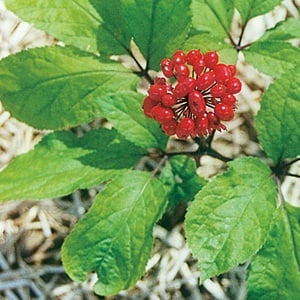
What is Ginseng?
Ginseng (Panax ginseng) is used to increase energy and sexual stamina and to slow down the ageing process. However, Ginseng's primary use is as an adaptogen during times of increased stress.
This herb is also known as Chinese or Korean Ginseng and records of its medicinal qualities were recorded more than two thousand years ago in the Chinese pharmacopoeia.
The word "ginseng" means "essence of man" in Chinese, which is appropriate as studies show that it can give one an overall sense of wellbeing.
In traditional Chinese medicine, dried ginseng root is used as a tonic to replenish vital life energy known as chi. The kick that you get from Ginseng is not like the one you get from other stimulants such as caffeine.
Traditionally people used Ginseng to help them recuperate after an illness or surgery and as a preventative remedy to build up their resistance to stress and disease. Once chi is revitalized, mind-body health is promoted and longevity should follow.
Key actions
- Increases mental and physical stamina
- Relieves insomnia, stress exhaustion and nervous tension
- Tonic
- Adaptogenic
- Boosts the immune system
What does Ginseng do?
Researchers have found that Ginseng has certain hormone-like and cholesterol-lowering effects on the body, while it simultaneously promotes dilation of the arteries. Ginseng is also an antidepressant and an anti-anxiety herb.
Ginseng has also been known to enhance ones learning capacity, whilst also protecting one against radiation and boosting one's immunity. The herb also increases one's energy levels and one's HDL-cholesterol levels (the good cholesterol).
This adaptogenic herb should be taken in times of stress, recuperation, infections and fatigue.
How does it work?
Scientists have isolated certain active constituents in Ginseng known as ginsenosides. It is believed that Ginseng gets its adaptogenic effect from the opposing functions of specific ginsenosides, as some may for example, stimulate the central nervous system, while others suppress it. This could be how Ginseng is able to enhance bodily functions to adapt to the body's needs as a specific time.
Ginseng is an adaptogen which means that it helps regulate the body's systems and restores a healthy balance. More specifically though, Ginseng helps to balance the release of stress hormones. Adaptogens do just what their name suggests, they adapt to the body's needs by moving to any cell to restore the specific functioning in that cell.
Adaptogens also support the adrenal gland (or "stress gland") during times of increased stress. Excessive stress can deplete the secretion of the adrenal glands stress hormone (adrenalin, noradrenalin and cortisol), causing numerous health problems.
Indications
Stress and nervous exhaustion
Ginseng helps the body adapt to fatigue, stress and the cold. It also helps the body cope with extreme temperatures, hunger and mental and emotional stress. If you are running low on sleep, Ginseng will have a sedative effect on the body. The herb's adaptogenic properties increase physical endurance and cause physiological changes that may help the body to adapt to fatigue and overwork. Ginseng can also help one cope with stressful life events, such as writing exams or divorce.
Immune system
Elderly people in Northern China, often take the herb to help them through the long harsh winters. This is because Ginseng boosts immune function. Ginseng is considered by herbalists to be a life-enhancing tonic. It is stimulating in the young, but restorative and even sedative in the aged and the ill.
Athletic tonic
Ginseng improves stamina and is therefore a popular stimulant tonic herb for athletes.
Other functions
Studies have found that Ginseng stimulates immunity against colds and other infections. It also seems to help with diabetes (it improves blood sugar control), improves mental function, reduces frequency of herpes infections, boosts sport performance and enhances the functioning of the whole person.
Dosage
Consult your doctor or a professional herbalist to see how much of which preparation you should use for your condition.
- Capsules for nervous exhaustion, take a 500mg capsule once a day.
- Tablets can be taken for short-term stressful events, such as writing exams.
- One to two grams of Ginseng root per day for up to three months.
- Standardized extract (4% total ginsenosides: 100 mg twice daily for up to three months).
- Add one gram of dried root per portion of vegetable soup and use it daily as a general tonic.
- Tincture can be used for diarrhoea cause by weak digestion.
- Make sure that any products you buy contain the active components, ginsenosides, as some so-called Ginseng products don't contain Ginseng at all.
Possible side effects
If used properly, Ginseng should not have any side effects. However, if you experience any adverse side effects or reactions, see your doctor. Some studies suggest that ginseng may increase blood pressure. Otherwise this is a very safe herb with a low toxicity profile.
Are there any potentially dangerous herb-drug interactions?
Do not take Ginseng if you are on any blood thinning medications, such as warfarin or heparin as the herb might increase your risk of bleeding problems.
Ginseng combined with certain antidepressants may cause headache, trembling and manic behaviour.
Ginseng may also interfere with the heart medication digoxin's pharmacologic action or the ability to monitor digoxin's activity.
Ginseng can reduce blood sugar levels in people with type 2 diabetes. Without careful glucose monitoring, using Ginseng with insulin or oral antidiabetic medications may cause dangerously low blood sugar levels.
Caution
- Do not exceed the prescribed dose.
- Do not take for more than six weeks.
- Some studies suggest ginseng may raise oestrogen levels in women. Don’t take it if you have an oestrogen-related disease, such as breast cancer.
- Avoid caffeine while using Ginseng.
- Do not take if pregnant.
- Stop using Ginseng at least 7 days prior to surgery.
- If you have uncontrolled high blood pressure, Ginseng may raise blood pressure, so don't use it.




 Publications
Publications
 Partners
Partners









